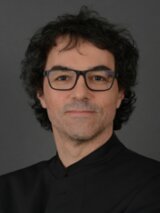Advances in precision oncology are moving the field towards a biology-based cancer care, and ESMO is supporting the change with a series of tailored resources for medical oncologists
The traditional characterisation of the disease by the organ in which it originated continues to determine how cancer care is delivered: for patients, having breast, lung or colon cancer defines which hospital department and doctor they will be referred to and, in the majority of cases, which treatments and clinical trials they will have access to. A comment in Nature recently illustrated how the organ-based classification of cancers and sequential testing of new medicines in defined tumour types has delayed patients’ access to innovative treatments—in some cases by several years. “We urgently need a new approach to classifying oncological diseases, to bring clinical research in line with modern oncology, cutting down costs and resources,” says Prof Fabrice André, Director of Research at Gustave Roussy Cancer Campus in France, co-author of the above-mentioned article and ESMO President-Elect.
Tissue-agnostic research is an emerging field founded on the observation that sometimes the molecular determinants of response to a medicine can be shared between cancers. Conducting tumour-agnostic trials holds the promise of expediting clinical research while containing costs. “However, the implementation of this type of approach has so far been limited by the lack of a standard methodology for pharmaceutical companies to design their registration trials and for regulators to be able to issue tumour-agnostic approvals,” explains André. “Crucial questions include, for example, how many patients should be enrolled for each tumour site, how to define the relevant biomarker, and how to test whether some cancers should be excluded from the approval.”
ESMO is working actively in this area, and the release of the ESMO Tumour-Agnostic Classifier and Screener (ETAC-S) for assessing the tumour-agnostic potential of molecularly guided therapies could contribute to a common understanding among regulators and the clinical research community of the conditions in which tissue-agnostic development should be preferred to conventional trials. (Ann Oncol. 2024; Articles in press) Going forward, more research will also be necessary to develop standard criteria for defining when a biomarker can be considered as tumour-agnostic in the first place.
Preparing the wider ecosystem to support the change
The body of knowledge available on the genomic landscape at DNA level across cancers, André argues, is now mature enough to support such a shift. Rapid scientific and therapeutic advances are also what prompted ESMO to update its recommendations for the use of next-generation sequencing (NGS) for patients with advanced cancer earlier this year (Ann Oncol. 2024; Articles in press). Among other developments, testing recommendations have been extended to various new tumour types including rare cancers, covering both ESCAT tier I alterations and tier II investigational biomarkers, as well as selected tumour-agnostic biomarkers where patients have access to matched therapies.
But is the oncology community ready to become tumour-agnostic? “Patients themselves are increasingly demanding rapid access to targeted therapies. The question of the field’s maturity for tissue-agnostic research is not about whether people are going to agree or not, but rather ‘what is the benefit for the patient?’,” André highlights.
Cancer care evolution towards a tumour-agnostic approach comes with the need for a change in education for medical oncologists. For André, the era when clinicians simply needed to know how to interpret a clinical trial is over. “Today oncologists also need a strong background in biology and a deep understanding of the molecular and cellular mechanisms of disease—knowledge that is indispensable for them to integrate and implement information they receive both in genomic reports and in reporting of future biomarker-driven, tissue-agnostic trials,” he says. ESMO has a key role to play in producing and disseminating advanced learning resources and continuing education in the so-called molecular oncology, and André believes that also patients should be part of this process.
“Importantly, patients need to be educated in this new era of cancer care and learn to perceive their cancer by its molecular mechanism rather than by the location of the tumour. This may help them understand why they are receiving one treatment rather than another, and feel more engaged in clinical research,” he concludes.








